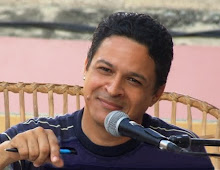escribanode@gmail.com
miércoles, 31 de diciembre de 2014
The discrimination cruch: PATRICIA: A PAIN BEFORE THE MIRROR
escribanode@gmail.com
He tied his ponytail
with the first ribbon he saw and in a flash, retraced the streets of Santiago de Cuba
He stopped to
pass through Enramadas Street
It is said he
wanted to look like La Doña
-María Félix, of course- and wore makeup to look resemblance to those big eyes
devouring the screen. He collected her pictures from magazines and pasted them
in an album he always carry with him.
He was already
an old man when I became aware of his existence. Nobody run behind him already.
Nobody yelled faggot or queer at him. They called him Patricia… a name that
reached the status of synonym.
He had beaten
homophobic people when that word did not appear in dictionaries, when derision
toward homosexuals was part of the national folklore. He n ever flinched: he
had made his own planet and
lived in it naturally.
It was another
matter that some people to knock at his door. A pact of silence was agreed at
late night. “To hold such a condition publicly” was a social disgrace.
Hypocrisy was awarded, and besides, few had Patricia’s courage.
One afternoon I
approached him. He showed me his identity card in Céspedes Park
I pressed the
camera shutter. He showed a frozen artist smile while wearing a very old strap
blouse. When I show that picture, people wonder if that’s my grandmother.
Patricia would have liked: Finally! the years had given him more than wrinkles,
had revealed the woman.
“I’ve never been
in Havana
Patricia washed
clothes for living, worked in an agricultural farm, cleaned anything- God knows
what else -; many times for what they wanted to give him. He lived in a slum,
the drink was winning the battle to his mind … but he never spoke of that with
me.
Time after that
meeting, almost by chance, I heard that Patricia had died. I remember a
photograph of him with a fancy dress: the lean back, a spark of question and
another of wonder; a vase of flowers duplicated in a mirror.
Hopefully when
other Patricias question themselves before the mirror, we may have a fairs
answers.
(Tomado de ON Cuba)
Suscribirse a:
Enviar comentarios (Atom)






































































































No hay comentarios:
Publicar un comentario